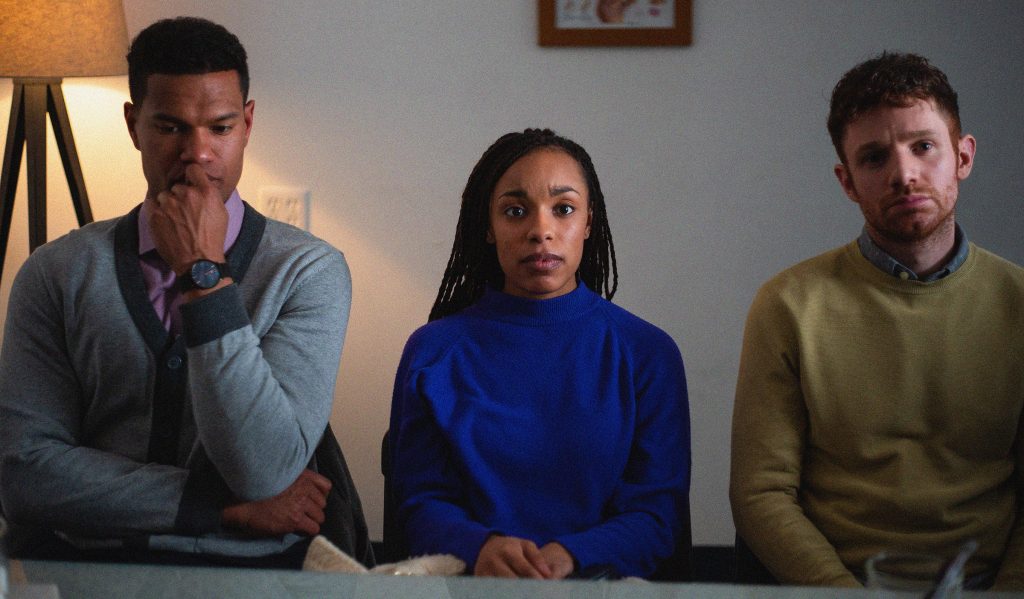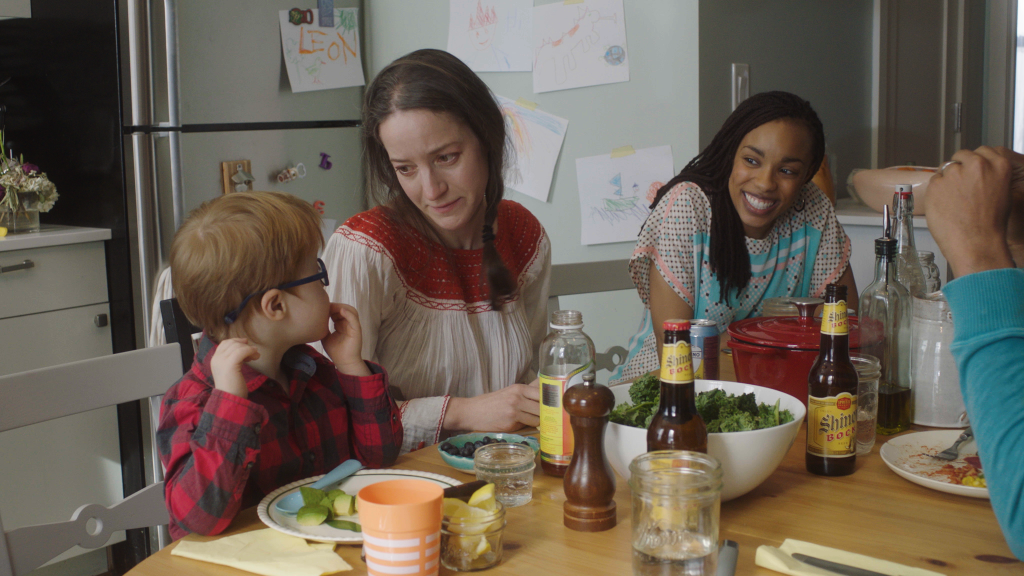June 12, 2020
by Carla Hay

Directed by Jeremy Hersh
Culture Representation: Taking place in New York City, the drama “The Surrogate” has a racially diverse cast (African American and white) representing the middle-class.
Culture Clash: A woman who decides to be a surrogate for her two gay best friends has to make a serious choice after getting a medical diagnosis for the unborn child.
Culture Audience: “The Surrogate” will appeal primarily to people who like realistic, well-written dramas about family planning and family choices.

Most movies about a surrogacy pregnancy assume that the child will be born perfectly healthy. “The Surrogate” is a drama that takes a significant and often uncomfortable look at what can happen when an unexpected medical diagnosis for an unborn child can alter the relationship between a surrogate and the child’s parents. Writer/director Jeremy Hersh (who makes his feature-film debut with “The Surrogate”) tells this story in a compelling and authentic way. Some viewers might be divided over the movie’s ending, but there’s no denying the impact that this film can have on viewers, regardless of what kinds of families that people have.
The title character in “The Surrogate” is personified by an excellent performance Jasmine Batchelor, who plays Jessica “Jess” Harris, a 29-year-old Web designer for a Brooklyn, New York-based nonprofit that helps incarcerated women. Jess’ life seems to be going pretty well. Even though she’s somewhat bored with her job and is feeling restless about her career, Jess is living comfortably and has the emotional support of her two gay best friends Josh (played by Chris Perfetti) and Aaron (played by Sullivan Jones), who are married.
Jess has recently broken up with Nate (played by Brandon Micheal Hall), who is in love with Jess, but she doesn’t feel the same way. She tells Nate that one of the reasons why she wants to end their relationship is that she doesn’t know where she will be a year from now. Shortly after the breakup, Jess gets some happy news: She’s pregnant as a surrogate for Josh and Aaron.
The three friends celebrate over dinner and make plans for the arrival of the baby. They all fit the profile of young, educated urban professionals in New York City who consider themselves to be politically liberal and socially conscious. Jess and Josh have known each other since they were students at Sarah Lawrence College. Aaron is an attorney at a law firm.
Jess comes from an upper-middle-class family that has expected her to be a high achiever. She and her mother are connected to the Ivy League: Jess has a master’s degree from Columbia, while her outspoken mother Karen Weatherston-Harris (played by Tonya Pinkins, in a scene-stealing performance) is a dean at Yale University. Jess’ immediate family also includes her father Stephen Harris (played by Leon Addison Brown) and her older sister Samantha (played by Eboni Booth).
When Jess breaks the news about the pregnancy to her mother and sister over a meal at restaurant, Karen is skeptical about how well the arrangement will go. Jess explains that even though it’s illegal in New York state to pay women to be surrogates, it’s legal to cover all of the surrogate’s expenses during the pregnancy, which is the deal that Jess has with Josh and Aaron. Jess convinces Karen that she’s doing the right thing because the surrogacy is what Jess, Josh and Aaron want, and all three of them are happy about it.
But then, there’s an unexpected diagnosis 12 weeks into the pregnancy: The unborn child has Down syndrome. This diagnosis sets in motion a series of events that make Jess, Josh and Aaron question many things about themselves, their friendship and being the parent to a child who doesn’t fit the ideal standard of “healthy.”
Taking care of a special-needs child is a subject that needs to be handled carefully in a movie, or it could risk coming off as either too condescending or too insensitive. Luckily, Hersh’s screenplay for “The Surrogate” is so well-written that it shows different sides of this very complex issue. Jess, Josh and Aaron react in three very different ways.
After getting over the shock of the diagnosis, Jess eagerly explores the options for the child, as she makes arrangements for her and Josh to hang out at a community center that has activity programs specifically for children with Down syndrome. (Aaron isn’t at these playdates, presumably because he couldn’t take time off from his job at the law firm.) It’s immediately obvious that Josh is the one who is the most upset by the Down syndrome diagnosis. Aaron (who’s more passive and less talkative than Josh) seems to have a “wait and see” outlook, and at first Aaron doesn’t seem to lean either way on what to do about the child.
Jess picks up on Josh’s negative attitude about having a child with Down syndrome and asks him why he feels that way. Josh tells Jess that his childhood friend Kelsey had a brother named David with Down syndrome, and he remembers David as an emotionally withdrawn person who didn’t seem to like talking to people. (David is now deceased.) Josh expresses his fear of having a Down syndrome child who is anti-social, but Jessica tells him that many children with Down syndrome are emotionally withdrawn because parents don’t know what to do with them.
She tells him that many Down syndrome children in the past were wrongly institutionalized when they could have been integrated into society. Jess educates Josh over the progress that has been made in helpful resources for parents of Down syndrome children. And she encourages Josh to keep going to the community center with her to interact with Down syndrome kids.
During these community center playdates, Jess gets to know some of the parents and makes an effort to be friendly and engaging. Josh is outwardly present, but inwardly he remains somewhat aloof. Meanwhile, Aaron (who seems to be a workaholic) hasn’t yet weighed in with his opinion on what to do about the pregnancy, but it’s pretty obvious that he’ll probably do whatever makes Josh happy.
As for Jess, she gets more involved in the world of Down syndrome parenting. There are two mothers from the community center who seem to be the most open to Jessica hanging out with them outside of the community center: Bridget (played by Brooke Bloom) and Sandra (played Meg Gibson). Bridget (who owns a catering business) is more down-to-earth than Sandra, so Jess gravitates more toward Bridget.
There’s a pivotal scene in the movie where Jess, Josh and Aaron go over to Bridget’s house to have lunch with Bridget, her husband Dan (played by Erin Gann) and their extroverted and adorable Down syndrome child Leon (played by Leon Lewis). Jess asks Bridget if there’s anything that she wish she had known before having a Down syndrome child. Bridget replies, “I underestimated how much time I’d spend fighting … with bureaucrats.”
Bridget also admits that she doesn’t like Sandra very much because Bridget thinks Sandra treats her Down syndrome child like a “magical creature” instead of a real human being. Bridget also has this to say about Sandra’s parenting style: “I find her approach objectifying.”
This conversation brings up issues for parenting special-needs kids: the laws that don’t necessarily look out for these kids; the added pressures of finding the right resources and medical attention for the children; and even the judgments that other special-needs parents have about each other.
Another effective scene (even though it’s a little heavy-handed) is when Jess goes to a trendy-looking restaurant, just to ask the manager (played by Hannah Cabell) what the restaurant does to accommodate people who can’t use stairs, since the restaurant doesn’t have a ramp. The manager, who gets a little defensive and dismissive, says that they would have employees carry the person into the restaurant, but that the restaurant was working on getting a ramp.
A visibly annoyed Jess then tells the manager that a potential customer walking past the restaurant wouldn’t know that. She also informs the manager that the restaurant’s layout violates the Americans with Disabilities Act, so the restaurant is breaking the law by not having accommodations for physically disabled people. This scene seems to have been written as a “teachable moment” for viewers who might now know about this law. And the scene also shows that Jess has become more socially aware of the rights of disabled people.
Jess seems to be very involved in getting as much information as possible, but one of the issues that the film realistically depicts is that it might be easier for her to be so enthusiastic about raising a special-needs child because, as per her surrogate agreement, she wouldn’t have to pay for the upbringing of the child she’s carrying. The additional financial expenses of raising a special-needs child have a lot to do with Josh’s and Aaron’s reticent reactions to the Down syndrome diagnosis.
“The Surrogate” also does a great job of portraying other issues, such as the rights of gay parents; how class and privilege determine someone’s outlook toward parenting special-needs kids; the rights of surrogates; and the expectations of African American upper-class families who pride themselves on not following negative stereotypes. In addition, the movie shows the prejudices and discomfort that some women can have toward other women who choose to be surrogates.
One thing that the movie thankfully doesn’t do is pass judgment on which of the three friends is the “best person” in handling the Down syndrome diagnosis. Perfetti is especially effective at portraying Josh’s inner conflicts about whether or not he wants Jess to continue with the pregnancy. Is he a bad person if he rejects the idea of having a special-needs child? The movie doesn’t force people to think one way about it, but the film does show how people can be inherently biased toward wanting children who are healthy and perceived as “normal.”
Although Jess is the story’s central character, “The Surrogate” presents diverse viewpoints and allows people to make up their own minds about the important issues that are in the film. It’s the type of well-made storytelling that’s very much needed in cinema right now. Hersh is definitely a talent to watch, and it will be interesting to see the feature films he does next.
Monumental Releasing released “The Surrogate” in select U.S. virtual cinemas on June 12, 2020.
